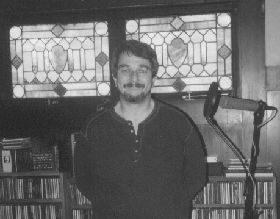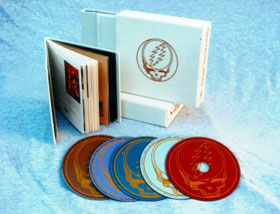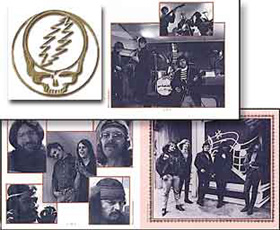|
There are some voices in the Grateful Dead community which are as familiar to us as some of Jerry's best guitar licks. One of these voices is that of David Gans. Many know David best for the Grateful Dead music he has been broadcasting to fans on his national radio show, The Grateful Dead Hour, as well as his West Coast show, Dead to the World. Not only has he provided us rare Grateful Dead music on the radio, but he has also played a huge role in producing the recently released Grateful Dead box set - So Many Roads. Philzone.com recently had the pleasure of speaking with David in great detail about several topics including David's band the Broken Angels, whom many credit for "turning on" Phil Lesh and inspiring his return to the stage. The band played three historic shows (11/6/97, 12/27/97, 1/31/98) with Phil prior to the first "official" Phil Lesh and Friends show in February 1998. Check out Philzone.com's special AudioZone featuring highlights from all three Broken Angels' shows with Phil Lesh. David
Gans has turned on Grateful Dead fans for years and has even helped
turn on key members of the Grateful Dead. Now, let Philzone.com
turn you onto what David has to say. |
|
It was a privilege to work on that and a thrill to boot. What did it feel like to have the responsibility to go into the vault with the idea of coming out with a definitive Grateful Dead record, so to speak, vs. your history as collector and show producer? It
really was an honor to be selected for it. It wasn't a huge
responsibility or anything because it seemed like well, it was
a responsibility, but it wasn't like a big scary thing because
there were two other guys -- three other guys on the team if
you count Dick Latvala, who was more or less a part of our You can't beat that! Did the process for you, in terms of picking songs, differ than how you go about it for your own show? The
threshold of acceptability is higher for a CD, a box set, then
it is for a radio show. I get away with a lot looser performances
for the radio show. Things had to be spectacular.
I also work in longer forms for the radio show. I can play a 45-minute set, or I can play an entire show broken up over a few weeks. Here, we were looking for that isolated gem and the occasional sequence of songs. It was a very different thing, sort of more granular, and again the quality threshold had to be a lot higher. How did you come to some of those decisions, like picking a jam as opposed to the whole song, particularly the jam from 9-18-90 out of "Foolish Heart" ? For one thing, we listened to a lot of versions of Foolish Heart and could not find one that was acceptable for the set. There were a couple that came close, but it was one of those songs that never really -- or rarely -- was a real stellar performance. Jerry botched the words a lot of times. Actually we heard on a rehearsal tape, we heard him talking about it. They were in a rehearsal and were working on a bunch of other songs, and said 'are we gonna try Foolish Heart?' and Jerry said 'No, we're only gonna work on new stuff in this session here'. Then he went on to say, 'ya know, something about that song just never quite came together' and he mentioned that the sentiments included in the lyrics didn't resonate completely with him. So that, in a way, helped justify our decision not to use one. We also, very very early in our process, decided that we wanted to do some things that were isolated jams -- and Phil Lesh agreed with us completely on that. He really loved that idea and made it very clear to us that we were encouraged to do that. One of the criticisms that we took from Deadheads before the thing was even finished was this whole thing of 'How dare you take a song out of context. It only is valid in the context of the set.' And we said, 'First of all, that's not true -- or at least it's an arguable thing. There is a lot to be said for presenting an entire Grateful Dead concert as a piece of work, as a complete thing, but there's no tradition that says that that dogma is the main thing.' All of their live albums have been edited, and things have been taken out of context. Our mission here was to come up with a thirty-year overview, and it wasn't possible to have unbroken jams. The Salon reviewer criticized us for doing Eyes of the World and Estimated Prophet separately rather than as an Estimated>Eyes. Our answer to that was, 'Just because Estimated>Eyes was a cliché combination for a number of years, that doesn't necessarily mean that that's the only valid way to present those songs'. My first-cut short list of stuff to include on this Box included the 10/19/74 Eyes of the World, on which the other guys all agreed with me, so that precluded an Estimated>Eyes. We did not feel obligated to put things in their "natural" sequences, because it wasn't practical. Our original thought -- I guess I'm sort of rambling here, but our original thought was, we were going to design each CD around a long jam. Oh really? Well,
it would have been a fun way to go. There'd be shorter pieces,
some studio stuff, then a big live jam -- which everybody agrees
is the heart of what Grateful Dead music was about -- and then
maybe some shorter pieces after. We wanted to make this thing work in the context of existing body of released material. Which is to say, all the Dick's Picks and live vault releases and Live Dead were taken into account as we made our selections. We didn't need to have a Lovelight, because the one on Live Dead is such a peak and we also figured that the Dark Star>St.Stephen>Eleven thing works so well that we didn't feel we needed to replicate that in here. I lobbied hard for the Dark Star>China Cat>Eleven that we wound up using because it was really a great moment in the compositional history of that stuff. It was a transitional version of China Cat. They were in the process of changing it from the key of E to the key of G, and so you hear an interesting performance that's bracketed by wonderful jams and it tells you what China Cat Sunflower was and what it was going to become. You can go listen to the China Cat>Rider on Europe '72, or any of the other ones that are on Dick's Picks. The one on the June '74 Dick's Picks is definitive -- that right there is the China Cat>Rider, so we didn't feel like we needed to include a China Cat>Rider in the Box Set. You know what I mean? Right, right! This thing, in a way, could be said to be sort of the grout between the tiles of the Grateful Dead's mosaic. Beautiful! We made reference in the liner notes to all the other stuff. We took heat from people because we didn't include this jam or that jam. We would have chosen a 1977 Scarlet>Fire, except the 1990 one was so great, so concise and so necessary, and so indicative of what was going on with the Grateful Dead in the 1990's with the MIDI instruments and stuff like that. We decided on that one, knowing there would be plenty of Scarlet>Fires available. You mention each of you had your own 'short list'. Were you thinking of certain songs which should be represented vs. the particular version of a song? Yes and no. We didn't make a list - we didn't say, either way, 'O.K. it's got to have all the big hits in it'. We never sat down and said 'What U.S. Blues are we going to use? What Truckin'? What Touch of Grey?' In fact, it's not really by design or intention that the sort of most popular or best known radio hits aren't included. It just worked out that way. We
were not under any marching orders from the record company to
make it any kind of greatest hits package. We were instructed
to put the Grateful Dead's best foot forward. And so were the fans! For the most part. Yeah, we've been thrilled with the feedback for the most part. I was pretty sure that Death Don't Have No Mercy from '89 was going to be on there and nobody really disagreed with me about that because that was one of those things where we could show the evolution. There's one on Live Dead from '69, the one from '89 had one of the greatest Garcia guitar solos of all time and it showcased everybody's vocals, you know, Brent sang, Bob sang, and Jerry sang. Steve was sort of notorious for having these momentary enthusiasms. He'd call up and go 'I have just found the coolest version of (yadda yadda) ever!' I'd listen to it and go 'Steve, I'm not so sure about that' and then the next day he'd have forgotten all about it and be onto something else. It was pretty cute. In a way, I guess I was the "bad cop" for quality, because I'm the musician in the group and have the most experience of picking things for broadcast and all that. Blair and Steve have been more fans and listeners and music lovers and I've been much more involved in the sort of critical process of choosing what works. So I did a little bit of education on them. In fact there was a time when we were recruiting help from various brain trusts, the Compendium Mailing List, Jeff Tiedrich, Michael Getz, and a whole bunch of really nice old time dead fans, the guys who wrote a lot of the essays for that book. I would call on them and say 'We're looking for a Terrapin and we'd like your opinions.' And I would say 'Put it on and listen to it, and the minute Jerry blows the words, stop and move on to the next one. Here are the things we're looking for: the mix has to be good; the vocal performance has to be flawless or very near flawless; and the instrumental has to have the energy.' All the stuff you want in a Grateful Dead performance, and a little tidier and neater than you're willing to accept otherwise. And we got some great ideas from people out there. We finally wound up with a Terrapin that Blair chose. I went through the DeadLists web page, picked out a bunch of sets that had Terrapins in them and handed them over to Blair. He went though them and found the one that wound up being the winner. There was one night Blair and Steve and I sat here in my living room listening to every version of Liberty we could find. Were you pulling from your own tapes? Yes. I have a fairly substantial stash from the time when Liberty was a standard in the repertoire, so I have probably 25 performances of it. We went through this stack of DATs, and we'd do that same thing - we'd put it on, we'd listen to it for a while, something would go wrong, we'd cringe and hit rewind, and put another one in. That must have been a good day. It was hard in a way, because we're listening to this great song and we're not hearing a perfect performance of it. It's a sobering thing, really, because while it's a truism that clean concise performances have never been a core value of Grateful Dead music, you'd still like to think that things were a lot more together then they were. Listening to a relentless stream of Jerry losing his place in the song, it had sort of a depressing quality to it at times. But at the same time, the energy was great. A lot of those exuberant happy versions of Liberty just weren't clean enough to be enshrined in the permanent medium of a boxed set. It was a little bit of a challenge to find the right performances, and actually in the case of Liberty we wound up choosing a rehearsal performance. John Cutler later substituted a version we hadn't heard. He had a few more up his sleeve that we hadn't been turned onto to and which turned out great. I mean I like the studio performance, but the live one that John found is really killer. We totally approved of his substitution on that. What is your history with Steve Silberman and Blair Jackson? How long do you guys go back? Blair and I met in 1976 or '77. I started contributing to a Bay Area music magazine called BAM. Blair was an editor at that magazine, and we met very early on in my career there. I think he was still a student at UC Berkeley. We've been friends ever since. He became the editor of BAM, and I was a Contributing Editor there for many years. In the mid-80's I helped him get the job he has now, which is Managing Editor of Mix Magazine. I had gone over there as Music Editor, and when they were looking for a Managing Editor, Blair was looking to step up, I helped him get that job. Just by coincidence, we became neighbors: my wife and I bought a house on their street in 1993. So we've been friends for over 20 years and neighbors for half a dozen. I first met Steve in the mid-80's. I remember the first time seeing him was at a book signing I did on Haight Street. I don't know why he made an impression on me then, and I don't remember when I first met him face-to-face. Might have been when he was working on Skeleton Key. I dragged him into cyberspace. I persuaded him to check out the Well. He really took to it like a duck to water. (By the way, I also claim responsibility for dragging John Perry Barlow into cyberspace. I had no idea he was going to wind up being the Emperor of Cyberspace that he became for a while there.) So Steve and I hang out together online all the time. So we've all known each other for upwards of 10 years, and it was extremely cool that we got invited together to do the boxed set. That's a great team! Speaking of the Well, how did you come into that scene? Deadheads were online for years before there was a Well. The Well went online in 1985. It was started by the Whole Earth Review People. Mary Eisenhart, who was the editor of MicroTimes Magazine at the time, and a major Deadhead and a very good friend of mine, had been talking up this whole notion of online communities to me and another friend of ours, Bennett Faulk, who's a columnist at MicroTimes and another serious Deadhead scholar. The idea was just kind of floating around for a while, and then at one of the shows at Henry J Kaiser in November of '85 it seems we all got hit by the same lightning bolt at the same time. We wound up at a party together after that show, and Mary and I sort of went off in this corner and started talking about this thing -- 'Why don't we start an online community for Deadheads? It's like a perfect subject for that.' She loved the idea and suggested we go to the Well. It was six months old at the time, and they were offering free accounts to people who had interesting ideas for community. Continue
Reading >> "I'd
Love to Turn You On - An Interview with David Gans" This
interview may not be republished anywhere in any form -- online
or offline -- without the express written consent of Philzone.com.
However, we certainly encourage you to link to this Interview
from your page. |



